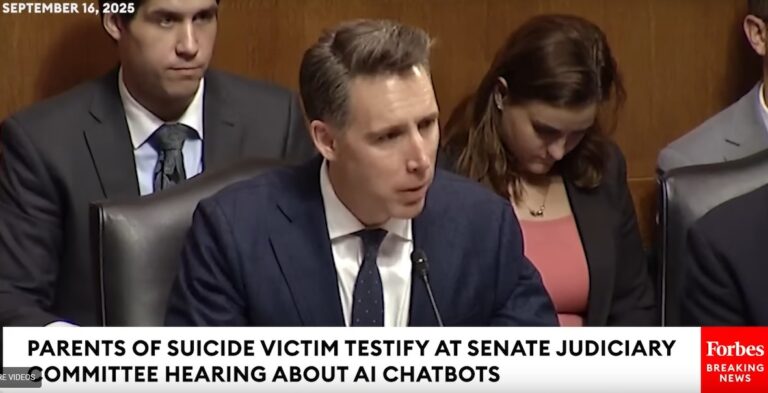Protecting Our Kids’ Developing Brains Starts Now
Something powerful happened recently at a Senate Judiciary Committee hearing.
Parents—real moms and a dad—came forward to share deeply personal stories of how smartphones, apps, and AI chatbots are impacting their children in alarming ways.
One mother’s words stood out. She spoke quietly, but what she said hit like a lightning bolt:
“They turned him against our family.”
She wasn’t talking about a teacher or a friend group. She was talking about a chatbot. An AI program that slowly influenced her child’s thinking, subtly shifting his values, pulling him away from his family and self-confidence.
And this isn’t an isolated case. Other families shared similar stories—stories that left lawmakers and listeners shaken. These were not abstract tech fears or theoretical risks. They were stories of loss, confusion, and kids who had changed in ways their parents never saw coming.
You can watch the full hearing here: Forbes Breaking News:
Watch the video – Sept 2025
Updates video – Dec 9, 2025
What We’re Up Against
Let’s be honest: AI chatbots, social media apps, and smartphones aren’t just tools anymore. They never have been. They’re powerful platforms of influence. They talk to our kids. And when we allow them into our children’s lives, they begin to shape how they see the world—and how they see themselves.
Kids simply aren’t ready to manage that kind of influence.
The science is clear. The brain’s prefrontal cortex—the part responsible for judgment, critical thinking, and impulse control—doesn’t fully develop until the age of 18 at the earliest. Often, it continues developing into the mid-20s.
That means a 12- or 14-year-old simply doesn’t have the neurological foundation to critically evaluate what a chatbot tells them or to navigate the persuasive algorithms on social platforms. Young people are still learning how to think, not just what to think.
Which raises a serious question: will we hand over smartphones and unrestricted app access to kids? Yet, this parent even had restrictions and protections on her child’s smartphone. How much longer will we trust AI, chatbots, or smartphones that leave an open door to influence our children’s thoughts and behaviors?
Time to Draw the Line
We need to start saying what many parents are already thinking.
No smartphone. No download apps. Not until 18.
It’s not about being controlling. It’s about being protective. About giving our kids the space and time to develop into strong, independent thinkers before they’re exposed to powerful technologies designed to influence them.
We restrict alcohol, tobacco, and driving for a reason—maturity matters. It should matter just as much when it comes to digital tools that quietly shape a child’s identity and sense of right and wrong.
What You Can Do Today
Here’s where change starts—right now, at home, in schools, and in the halls of government.
-
As PARENTS: Set a firm, loving boundary: no smartphones, no app downloads. It’s not always easy, but it’s necessary—and it’s an act of love.
-
As EDUCATORS: Support age-appropriate tech policies in schools. Speak up, and encourage a return to books and traditional research methods.
-
As LAWMAKERS: Recognize that this is an urgent public health issue. Regulation is overdue.
-
As a COMMUNITY: Start the conversation. Normalize the idea that it’s okay to delay digital access until age 18.
Guard their minds today. Shape their future tomorrow.
Yes, they’ve proven they can learn a device in minutes—even hours. But that’s not the same as having the maturity to handle what’s on it.
Until then, they need protection.
They need guidance.
And sometimes, they need us to say no.
Protect their minds now, so they can think for themselves later.
Childhood is short. Their minds are still growing. The risks are too high.
Let’s hold the line—and allow their skills, creativity, and passion to build during these critical years.
Let’s hold the line—for them.
DesertSchoolChoice.com – Know your options!
DesertSchoolChoice.com – Know your options!
DesertSchoolChoice.com – Know your options!

